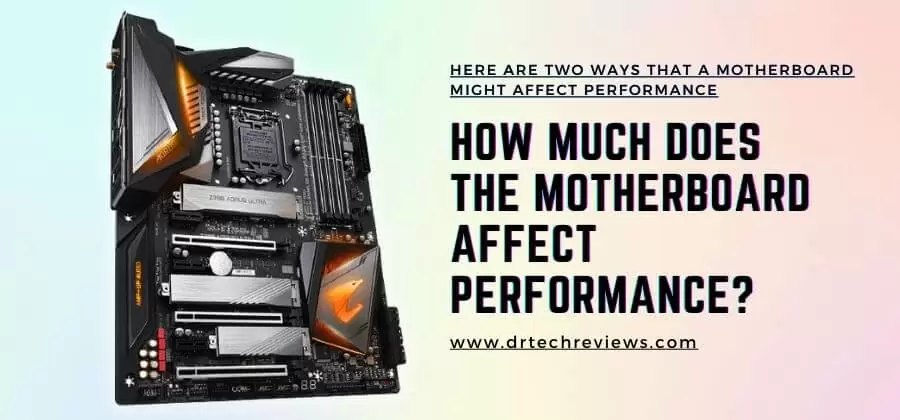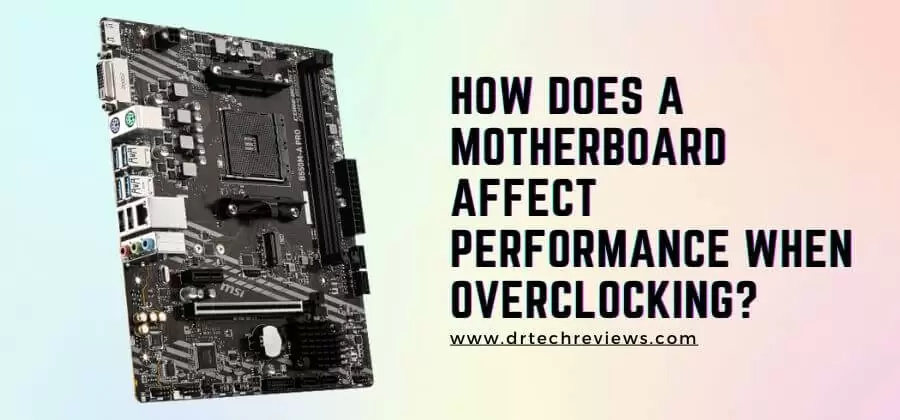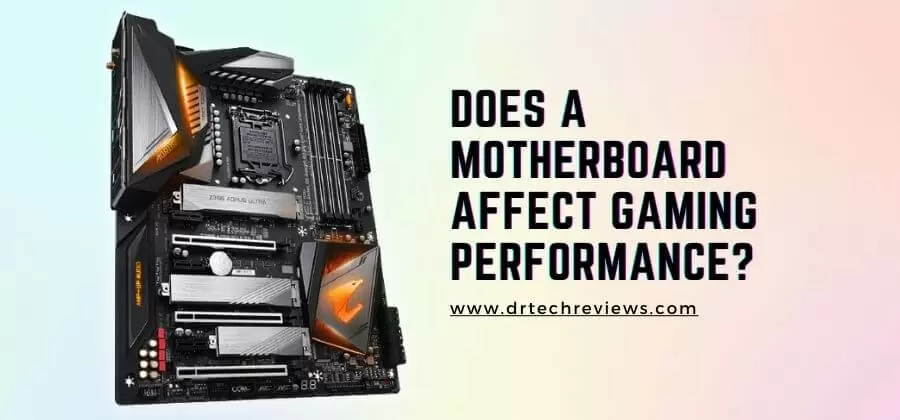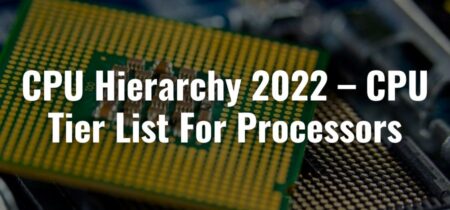Before you go, how much does the motherboard affect performance? You need to make sure that the motherboard really offers its services in affecting the performance of your system. Well, that’s a bit tech-savvy, and only the people close to tech know much about this. However, even if you are not one of them, you still don’t need to worry. Because we are here to answer your doubts and clarify what a motherboard actually does in your system!
About motherboard: A computer’s motherboard is undoubtedly one of its most important components. This is simply because it holds all the other components together. The motherboard is basically the main circuit board for your entire computer. It determines how fast your computer can go. Since it places limits on the speed at which the processor (CPU) and Memory (RAM) can operate. You can also think of it as controlling or connecting all the various parts of your computer together.
Overall, there is no system until there is no motherboard. Because it provides the ultimate base you need for the other products to work. But the question still remains the same, whether it affects the performance of your system or not. Let’s start figuring it out.
So, how much does the motherboard affect performance?

Genuinely speaking, the answer is neutral as it affects performance in one way. Plus, does not at all in the other way. The way it doesn’t affect the performance of your system is, it’s just a board that combines other components to work. Therefore, you cannot claim that it affects your system’s performance. This is because you haven’t even made a system with some high-end specs of RAM, CPU, or GPU.
The way it does affect performance contains having a high-quality motherboard from a very known brand. Also, the one that would be most compatible with your current rig and efficiently hold your system to work at its best. But the thing that comes at the top is it’s overlocking. Yes, when you go for overlocking. You can say that the motherboard holds great importance in affecting the performance of your system.
Here are two ways that a motherboard might affect performance
When we talk about motherboards affecting the performance of your system, there could be two possibilities. Either the motherboard affects performance on the positive side or the opposing side. Let’s have a look at both scenarios. This will describe when it involves the performance in a good way and when in a wrong way:
Motherboard affecting performance in a good way:
This only happens when you go for
- Overlocking or having high-end components
- Best or a high-quality motherboard for your system
- The one that is most compatible with the class of your processor
Motherboard affecting performance in a wrong way:
- When you buy a low-quality or budget motherboard
- When there is no overclocking, and you are running the high-end applications on your system
- Also, when your motherboard is not compatible with high-end specs, you want to overlock it.
So, what affects the performance of a computer? Memory, storage, and other similar components that you use for your computer need to work with the motherboard that you have. Suppose there aren’t any compatible parts for your motherboard. Let’s say you want to update the video card, but it won’t fit. Then that’ll mean that you can’t just “upgrade everything.” It will affect computer performance.
Because it’s basically impossible to get the best components if they don’t fit in the proper case. Also, take note of other things like replacing hard drives while keeping the same hardware environment so as not to crash Windows while updating!
How does a motherboard affect performance when overclocking?

Since I have made clear to you that the motherboard doesn’t directly affect the performance of your computer. But it can affect it indirectly with the other parts of your rig. The motherboard has a lot to do with overclocking. It is what makes your computer work at the speed it needs to be. Especially with overclocking, it is vital to have a motherboard with all the features required for overclocking, especially with overclocking.
All of that is done on the motherboard, whether it has the correct memory slots, the proper voltage stabilizers. Or the correct slots for the CPU cooling fan (if you want to overclock). Therefore, the motherboard is the main factor in overclocking.
The motherboard also determines what overclocking capabilities your computer will have and how it will perform. It will also determine what other hardware (such as video cards) you will be able to use. Overclocking does not detract from the importance of the motherboard in a computer system.
Therefore, the main ways through which your motherboard can lend a helping hand in the performance of your system are given as:
The VRAM design:
When it comes to VRMs, not all are made equal. Its quality depends on what components are used. Alternatively, they may be assembled differently. And the cooling rate used on the memory component can all affect how well your system can keep pace with itself while under full load. For instance, high-frequency pulsations (an oscillation behavior where current switches back and forth between states). This can cause voltage swings across your memory modules called ripple. Which Results in instability in some systems, particularly when overclocking.
Sometimes problems with these motherboard parts could cause fluctuations in your CPU/RAM performance. Like, shorten their lifespan, and may even cause you to overheat!
This means you will have to choose a motherboard with a perfect VRAM design. This must be the one that could easily hold and provide a stable voltage between the other components of your system.
RAM Trace Routing:
In terms of RAM trace routing, if the traces are not designed well. Your RAM may not train fast at higher speeds or timings, which results in the RAM running at lower clock speeds or timings. It is a known issue on Ryzen motherboards. Because AMD Zen-based Ryzen CPUs need high bandwidth response times. So problems with programmed tracks for communication between the CPU and RAM slots can cause serious hindrances to performance.
BIOS/UEFI firmware design:
When you turn on your computer, BIOS/UEFI firmware software loads at first. This firmware both directly and indirectly affects your computer’s performance. It initializes your hardware (processor, RAM, hard drive controller) and performs an early power-on self-test (POST). Then each device or feature of your computer loads one after another by making calls to BIOS to load various drivers – until the operating system starts up.
Also, you can use the BIOS or UEFI devices for configuring the information related to your computer’s hardware. These computers are responsible for configuring different features, including the CPU base clock, the RAM overclocks, and even undervolted RAM.
The clock speed of your CPU is reduced by 3% when you have a base clock of 97MHz. One will overclock their devices by 3% with a 103MHz base clock. This means this component of your motherboard also affects the performance of your machine indirectly.
Support for numerous components:
Components such as the processor, memory, and motherboards have varying support for different standardized speed performances. In this case, RAM sticks with a higher clock rate will perform optimally within the available set of specifications–especially when paired with a Ryzen-compatible CPU with a higher frequency.
SSDs come on two very different interfaces: SATA SSDs are slower than 550MB per second. But are more power-efficient than a mechanical drive. Alternatively, newer boards can support NVME drives which are much faster that can easily reach up to 400 MBs per second.
Moreover, SATA drives are cheaper because they use 6GBps connections, whereas NVME uses 6GBps or 32GBps connections. Theoretically, NVME is always faster, but only board manufacturers who get the newer NVME devices tend to advertise this because of the price differences.
Therefore, always look for components with the most updated specifications to experience smoother system usage overall.
No doubt, there could be other components too, and yes, they are the CPU, GPU. And how much RAM you store in your system. If the motherboard has to play its role in the system’s performance, it will perform in keeping things together and let them work at their best. This is what a good motherboard is capable of doing.
Does a motherboard affect gaming performance?

It would feel good if a motherboard’s chipset and its supporting processor had a high frequency. But this is not the only thing that affects gaming performance. The graphics card is a significant factor too. You can get a motherboard with a top-of-the-line processor, but if you put an old graphics card not optimized for gaming on it, you will not notice any significant difference.
Some motherboards may even have overclocking capability, but the processor cannot use it because it’s too slow. You would need a motherboard with high-quality, fast RAM if you are a gaming enthusiast. Ethernet would be better if it was fast.
While most modern motherboards are capable of overclocking, it’s better to go for a motherboard that has the option to overclock the RAM.
So, obviously, it does affect your gaming performance. However, the fundamental factor determining the speed and performance of your system is not the motherboard per se. But your processor, GPU, and RAM. A good motherboard can complement the performance of your RAM, disk, and CPU to make your system fast.
Whereas, a bad motherboard can hamper all your efforts to make your system fast. So, is a motherboard important for gaming? The answer is Yes, but not as much as you think.
Does the motherboard affect CPU temp?
Yes, it does to some extent. The motherboard for a computer is the main board that connects the CPU to other computer parts. It is the base of the entire computer system. Without the motherboard, there are no computer parts.
The CPU needs to be cooled down. If it is not, the CPU will get overheated and blown up, damaging the other parts. So, yes, you need to keep the CPU cool down.
Frequently Asked Questions
Does the motherboard affect FPS?
A good motherboard will definitely affect the FPS of a computer. The performance of a computer is dependent not just on the processor but on the entire hardware, of which the processor forms only one part. The motherboard on which the processor is placed is the single most crucial component on which the processor is installed.
It is essential to get a motherboard that provides maximum performance. A motherboard with the latest motherboard chipset is also very important. It will allow you to run newly released games on high FPS without any lag. However, this all relates to when you go for overlocking. Otherwise, it won’t matter at all.
Does the CPU affect gaming?
A few things affect a computer’s gaming performance. The most obvious is the video card. The video card usually requires the most power from the system, which affects the card’s speed. The speed of the video card is also highly influenced by how much RAM is on your computer. And, of course, the processor’s speed will affect the gameplay. In many cases, a faster processor can make a significant difference in the gameplay, especially if you have a reasonably high-end video card.
Does motherboard matter for gaming?
Yes, it does matter. Look, we all want to get the best value for our money, and nothing is more disappointing than spending a wad of cash on a decent gaming rig. Then having poor performance because of faulty components.
The thing about motherboards is that it is the backbone of the computer. Plus, the entire system’s performance depends on them. It’s like buying a Ferrari and putting in a Chevy engine. Sure, it’ll get you from A to B. But you’ll be spending more time at the shop than on the road.
There is a great solution to this problem, the MSI. This company makes high-end computers and laptops, and their motherboards are universally acclaimed. The motherboard has the most critical component on it, the CPU, and it is the best way to get good value for your money.
The great thing about MSI motherboards is that they provide a lot of bang for your buck, And they are designed and manufactured using cutting-edge technology. If you want to get the best motherboard for your gaming rig, then get an MSI motherboard.
Does ram affect performance?
Ram primarily affects the performance of your processor. Your processor will work faster and smoother if you have more ram on your computer. This way, it will be able to execute more instructions and commands simultaneously, and therefore finish tasks faster.
When you use your computer, you usually open several different programs at the same time. When you do this, your processor will also be simultaneously processing instructions and commands from each program.
If you have more ram, your computer will be able to handle the different instructions and commands from the other programs without slowing down. Thus improving the processor’s performance. This is why computers with more ram are able to work faster and smoother.
Summary:
After reading this blog, I hope you have learned that the motherboard is one of the most important parts of a computer. It is the main component that connects all of the other components together. From the power supply to the hard drive, everything goes through the motherboard. Moreover, you have also known how much does the motherboard affect performance which states that it does take part in the performance of your system, one way or another.
In the end, thanks for reading. If you have more queries to ask or information to add, please let us know. Have a nice day! Take care of yourself.

![How To Fix A CPU Cooler Not Lighting Up? [New Guide 2023]](https://www.drtechreviews.com/wp-content/uploads/2022/07/How-To-Fix-A-CPU-Cooler-Not-Lighting-Up-450x210.jpg)

![Why Is My CPU Cooler So Loud? [Facts 2023]](https://www.drtechreviews.com/wp-content/uploads/2022/07/Why-Is-My-CPU-Cooler-So-Loud-450x210.jpg)
![Fix Dual Monitor Lag In Windows [Explanation For Beginners]](https://www.drtechreviews.com/wp-content/uploads/2022/07/Fix-Dual-Monitor-Lag-In-Windows-450x210.jpg)
![Fix A Monitor Randomly Loses Signal [Problems & Solutions 2023]](https://www.drtechreviews.com/wp-content/uploads/2022/07/Fix-A-Monitor-Randomly-Loses-Signal-450x210.jpg)